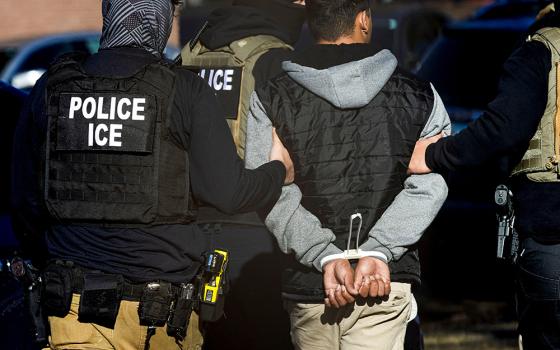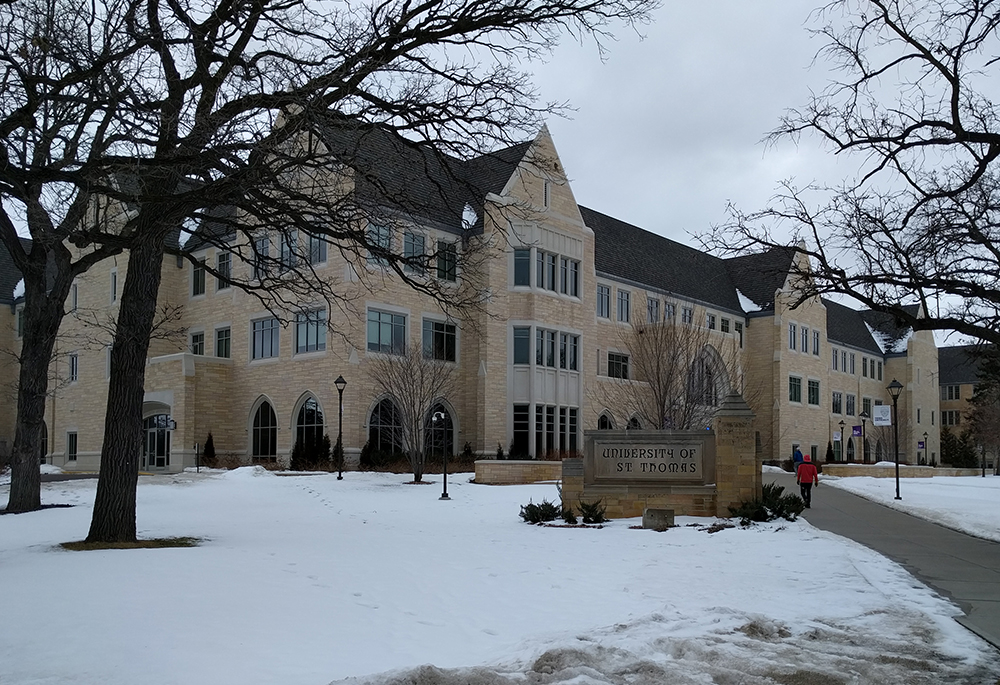
The University of St. Thomas campus is pictured in a 2016 photo. (Wikimedia Commons/Runner1928)
Paul Lucke is one of 185 students at the University of St. Thomas in St. Paul, Minnesota, who will lose scholarship money because officials in the Trump administration canceled a grant it deemed focused on diversity, equity and inclusion.
The cancellation of the $6.8 million grant this month illustrates the financial consequences from the Trump administration's attempts to eliminate diversity initiatives. The university said the program only references diversity in the grant application's requirements.
Lucke, an assistant at a public school with an autism program, said cuts will harm a program designed to address a shortage of elementary and special education teachers in Minnesota.
"The main worry isn't for myself and my career," said Lucke, "It's more how these cuts could discourage people from applying for this program, and how it will affect special education and elementary education students in Minneapolis."

Paul Lucke, a student at St. Thomas University in St. Paul, Minnesota, will lose scholarship money because the Trump administration has canceled a grant to help address teacher shortages. He is pictured with his dog, Charlie. (Courtesy of Paul Lucke)
The cut comes amid a more sweeping threat from the U.S. Department of Education, which sent a letter to schools and universities nationwide demanding schools cease using race in nearly any aspect of student life or "face potential loss of federal funding."
The letter has left colleges nationwide scrambling to decide whether to defend practices they believe are legal or upend a broad swath of collegiate operations, from college application essays to curriculum and campus student organizations.
The president of the Association of Catholic Colleges and Universities, which represents nonprofit, Catholic institutions of higher education, said the volume and pace of executive actions coming out of Washington, D.C., are "concerning, confusing and exhausting."
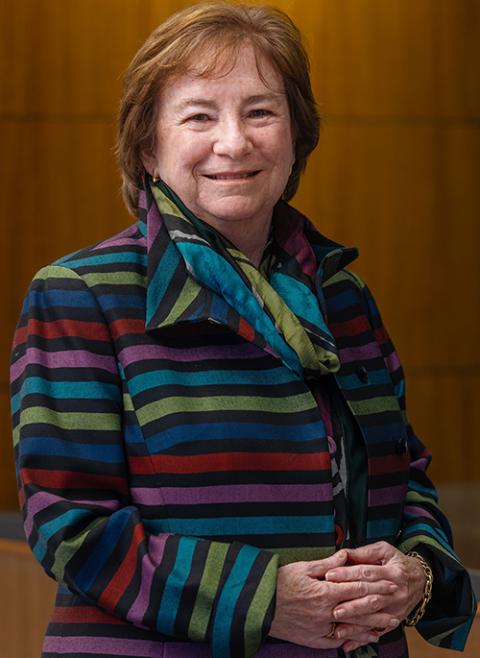
Donna Carroll, president of the Association of Catholic Colleges and Universities (Courtesy of ACCU)
"Catholic institutions, like others, are trying to sort through implications and develop strategies for responding, while we lean more deeply into expressions of mission, which provide us with clarity amidst so much uncertainty," said Donna Carroll, who became president of the Catholic college association last year.
The crackdown on diversity, equity and inclusion programs, commonly referred to as DEI, has affected Loyola Marymount University in Los Angeles as well. An environmental justice symposium at Loyola Marymount had to cancel two panel presentations after federal workers backed out as speakers, in reaction to President Donald Trump's executive order on diversity initiatives.
The Department of Education letter broadly interprets the U.S. Supreme Court decision gutting affirmative action in college admissions, Students for Fair Admissions v. Harvard, saying it means schools cannot use race "in decisions pertaining to admissions, hiring, promotion, compensation, financial aid, scholarships, prizes, administrative support, discipline, housing, graduation ceremonies, and all other aspects of student, academic, and campus life."
The Feb. 14 letter, signed by Craig Trainor, the education department's acting assistant secretary for civil rights, was sent to preschool, elementary, secondary and post-secondary institutions. Although it is likely to face legal challenges, it has sent a chill through the entire education field, and Catholic higher education institutions in particular.
For the past few years, leaders at Catholics colleges and universities have monitored the situation as some states have passed anti-DEI laws that primarily affected public institutions. A series that monitors the "Dismantling of DEI" by the Chronicle of Higher Education has been tracking changes at colleges in response to legislation and political pressure since January 2023.
No Catholic colleges were on the Chronicle of Higher Education's list until the most recent update, made on Feb. 14 in response to moves by the Trump administration. The list now includes Loyola Marymount, for the canceled sessions at the environmental justice conference.
DEI initiatives exploded in the aftermath of the so-called "racial reckoning" in the aftermath of the murder of George Floyd in 2020. Over the years, however, some organizations backed away from initiatives, especially those that prioritized diversity in hiring decisions. Opposition to diversity became a culture war talking point and priority of Trump's 2024 campaign — and he has made good on his promises during the first weeks of his second term.
Advertisement
For their part, Catholic institutions plan to uphold their values, grounded in the dignity of each human person and in the principle of solidarity, Carroll said, "but how we approach it might need to change."
"As Catholic institutions, at our core we are anchored in our values and Catholic social teaching," she said. "That's what drives the work we do: how we teach, the services we provide. It's who we are as Catholics."
Yet she recognizes the financial threats, as some Catholic institutions have a significant number of students who rely on federal Pell grants to fund their education. Cuts to federal funding for medical research from the National Institutes of Health also will likely affect Catholic institutions.
Already, some schools have moved to using the words "belonging," "dignity" and "justice," instead of diversity, equity or inclusion, to describe a more Catholic approach.
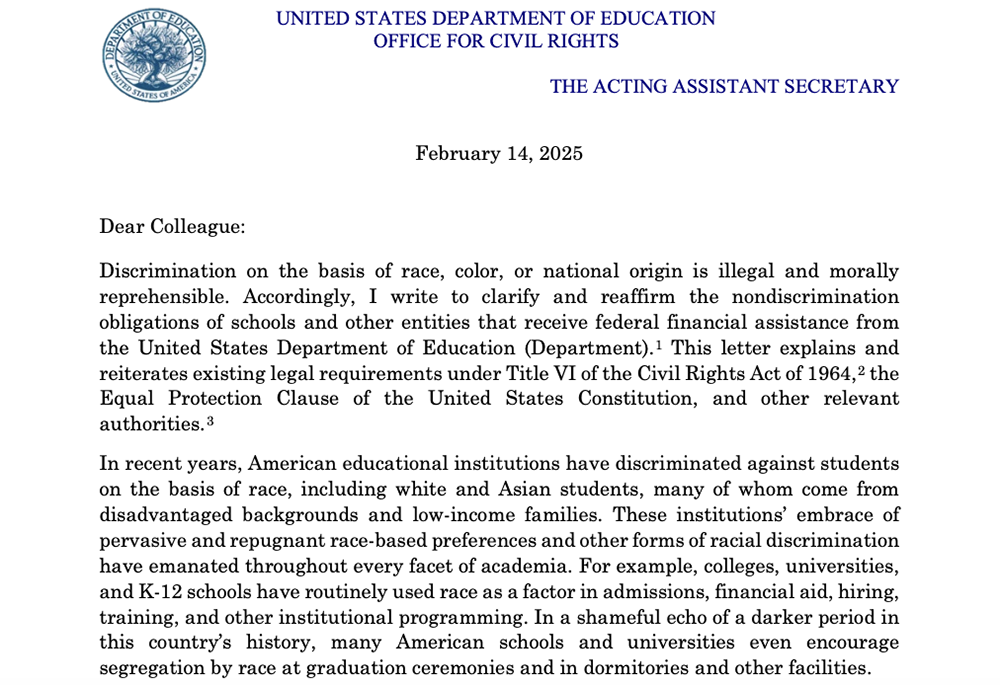
The U.S. Department of Education sent a letter dated Feb. 14 to schools and universities nationwide, demanding schools cease using race in nearly any aspect of student life or "face potential loss of federal funding." (NCR screenshot)
St. Thomas President Rob Vischer said he plans to appeal the cancellation of the special and elementary education grant. The university has committed to covering the students' tuition so they can complete the spring semester, but will have to work with students who were counting on that funding for their future plans.
"Because we're a Catholic university, our values won't change," he said. "We're committed to making sure every student has the experience of what Pope Francis calls 'the culture of encounter,' making sure they are seen and known and valued."
Even as St. Thomas remains committed to its Catholic values, "we're open to a conversation about certain terms to describe those values," Vischer said, noting that the acronym "DEI" has become a flashpoint.
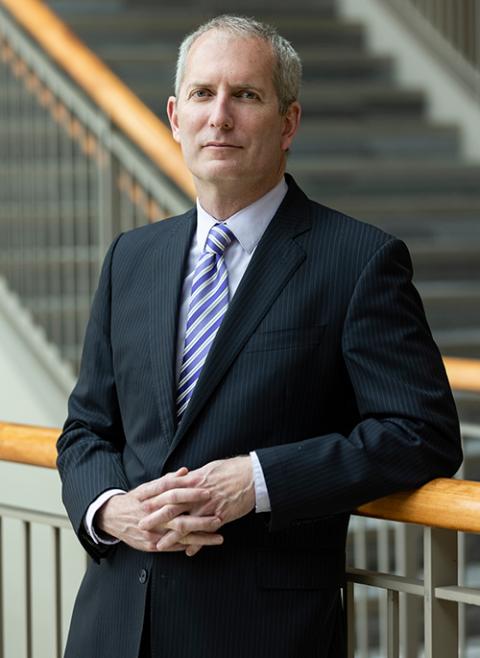
Rob Vischer, president of University of St. Thomas (Courtesy of University of St. Thomas)
According to Vischer, language about DEI was added as a requirement of the Department of Education grant application, and no preference is given to underrepresented minorities in the scholarship program.
"As a condition of the grant approval under the Biden administration we were required to have a component about how this grant would further diversity in the teaching profession," Vischer said. "We expected that some of those requirements and priorities may change with the new presidential administration, but we were hoping we'd have an opportunity to demonstrate how the grant could be brought into compliance with the new requirements, rather than an abrupt cancellation of the grant."
At an Association of Catholic Colleges and Universities meeting in early February, those who work in university diversity offices were understandably anxious. "It's a precarious time," Carroll said. "This is a difficult space to live in at the moment."
The language in the Department of Education letter accuses DEI proponents of "smuggling racial stereotypes and explicit race-consciousness into everyday training, programming, and discipline."
"Educational institutions have toxically indoctrinated students with the false premise that the United States is built upon 'systemic and structural racism' and advanced discriminatory policies and practices," the letter said.
Carroll said such an interpretation is "challenging," but encourages Catholic leaders to "think before we act, recognizing that Catholic colleges and universities, in the service of mission, have always been committed to student access, and our programs and services have always been about serving the common good of all students."




